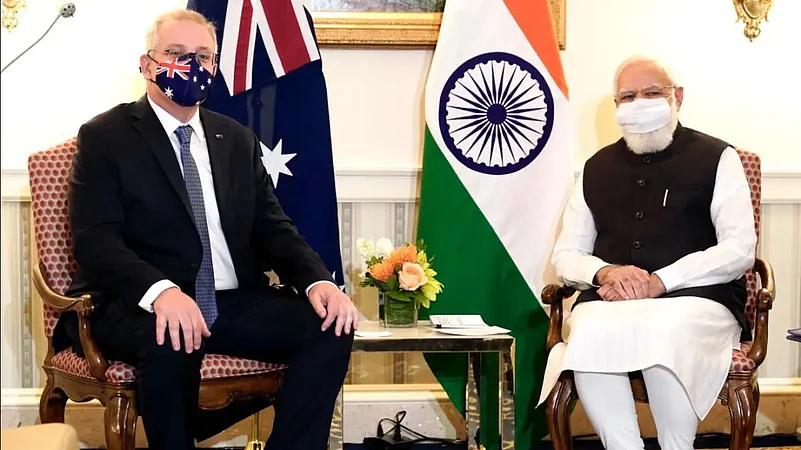Prime Minister Narendra Modi and his Australian counterpart Scott Morrison’s virtual summit on Monday focused on the Indo-Pacific and taking forward the expanding bilateral ties between India and Australia. Ukraine was very much on the table but was not the centerpiece of the conversation as it was during the weekend visit of Japan’s Kishida Fumio.
Both sides agreed that the conflict in Europe should not take the focus away from the Indo-Pacific. Though there was no reference to China by either leader, the simple message was to keep your eyes on China.
“Both India and Australia said that conflict in Europe should not be a reason to divert our attention from the Indo-Pacific,’’ Foreign Secretary Harsh Vardhan Shringla told reporters after the virtual summit. The annual summits will now become a regular part of the India-Australia diplomatic calendar.
Advertisement
With Washington’s attention diverted by the Russian invasion of Ukraine, there is concern in New Delhi that the Biden administration might be less focused on China and the Indo-Pacific as it had been before the Ukraine war.
India is under tremendous pressure from the US to condemn the Russian action. Australia however appeared more accommodating and acknowledged that India had its own equation with Russia and the strategic dimension in the Indo-Pacific involves China’s muscular action in the region.
Prime Minister Morrison set the tone of the conversation in his opening remarks at the summit.
He said, “Our meeting today is of course set against the very distressing backdrop of the war in Europe which must never happen in our own region. While we are obviously distressed at the terrible situation in Europe, our focus of course is always very much on what is occurring in the Indo-Pacific and ensuring those events could never occur here.”
Advertisement
The reference here is obvious.
He added, “Our region is facing increasing change and much pressure. I think our Quad leaders’ call recently gave us the opportunity to discuss Russia's unlawful invasion of Ukraine. But it also gave us the opportunity to discuss the implications and consequences of that terrible event for our own region and the coercion and issues we face here.
“The tragic loss of lives underlines the importance of holding Russia to account. The co-operation between like- minded liberal democracies is the key to an open and inclusive, resilient and prosperous Indo-Pacific.”
Prime Minister Narendra Modi in his remarks said there was good co-operation among the Quad members, comprising of India, Australia, US and Japan.
He said, “This collaboration of ours reflects our commitment to free, open and inclusive Indo-Pacific. The success of the Quad is critical to regional and global security.”
Modi spoke of the tremendous progress in bilateral ties between the two countries.
He said, “Our relations have made remarkable progress in the last few years. Trade and investment, defense and security, education and innovation, science and technology – we have very close cooperation in all these areas. Our collaboration has grown rapidly in many other areas, such as critical minerals, water management, renewable energy, and COVID-19 research.”
At the briefing after the virtual summit, Shringla told reporters that the two leaders exchanged views on important regional and international issues. Both Ukraine and China were on the table.
Advertisement
“On Ukraine it was clear that the two sides referred to the Quad summit in which leaders had a fairly clear perspective that the situation in Ukraine should not occur in the Indo-Pacific and that the focus and priority of the Quad should remain the Indo-Pacific,” explained Shringla.
Shringla also said that there was serious concern about the conflict in Ukraine and the humanitarian crisis there. Both leaders wanted an immediate halt to hostilities and were concerned about the human tragedy unfolding in Ukraine, especially the fate of women and children caught in the conflict. India and Australia agreed that “the rule of law and respect for territorial integrity and sovereignty of states was emphasised by both leaders”.
Advertisement
The two leaders spoke at length about China. Modi briefed Morrison on the breaches along the Line of Actual Control by China and the need for peace and tranquility in border regions before relations between the two countries can get back to normal. Morrison spoke of issues in the South China Sea and China’s aggressive moves around the Indo-Pacific.
India and Australia’s economic ties are also gathering steam. Australia’s investments in India are around $15 billion, while India has invested $12 billion in Australia. To attract Australian investments in India, the two leaders agreed to increase co-operation between India’s National Investment and Infrastructure Fund and Australia’s Pension and Sovereign Fund. This entails giving tax benefits by the Australian government for investments here as they get in their own country.
Advertisement
India and Australia are also hoping to ink a free trade agreement. While it would take time to complete all negotiations, an early harvest agreement aimed at liberalising tariffs on certain items could be completed by the end of the month.




















